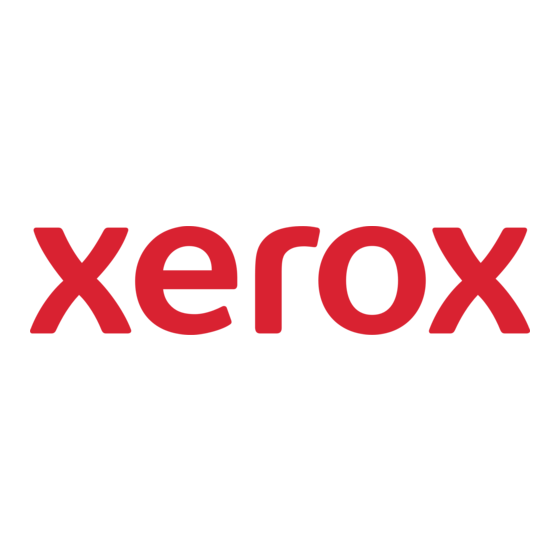- ページ 5
プリンター Xerox Color C70 SeriesのPDF インストレーション・マニュアルをオンラインで閲覧またはダウンロードできます。Xerox Color C70 Series 35 ページ。 Quick network scanning guide
Xerox Color C70 Series にも: インストレーション・マニュアル (34 ページ), クイック・ユース・マニュアル (3 ページ), クイックマニュアル (1 ページ), クイックマニュアル (1 ページ)

Detailed Specifications
2 Detailed Specifications
Product Specifications
System Specifications
Print Speed and
Monthly Volume
Simplex Speed
Up to 65 /60 ppm
B&W/Color
Recommended
15,000-60,000 pages
Average Monthly
1
Print Volume
Maximum Monthly
Up to 300,000 pages
2
Duty Cycle
What exactly is Duty Cycle?
Duty Cycle is a print device's rated capacity to continuously perform
work under normal conditions. It is usually expressed as the
sustainable volume in letter- or A4-sized pages that can be printed per
month.
Define the problem
When discussing a machine's capabilities, there is often a
misconception about its Duty Cycle. Customers tend to think in terms
of duty cycle, while Xerox thinks in terms of AMPV (Average Monthly
Print Volume). Many print device vendors today do not define what
these terms mean, how they are different, and how it affects a
customer.
What are considered "normal conditions"?
Because Duty Cycle is based on how the printer performs under
"normal conditions," you first must define what "normal conditions"
are—and there are many factors that affect the execution of everyday
print jobs. These include everything from the robustness of the
machine and the types of applications being run to the physical
environment in which the customer is printing.
In addition, any true measure of what constitutes "normal" must
account for those occasions when a job is running at less than
maximum speed. And as we all know, there are other times that for
any number of reasons, a job isn't running and the machine sits idle.
It's a natural part of the printing business. So to calculate Duty Cycle,
Xerox took into account these "normal conditions", as well as the
anticipated shift usage per week, to consider all factors that a machine
and its operators may encounter when running print jobs.
What is the difference between AMPV and Duty Cycle?
Duty Cycle takes into account the actual capabilities of a machine with
varying circumstances, while Average Monthly Print Volume (AMPV) is
the volume an average customer is expected to produce on a machine
in a month. AMPV reflects a range of an entire machine population's
monthly usage, while Duty Cycle displays the potential to grow while
still utilizing the machine. This is important to keep in mind because
although a customer's typical print volume may fall into the AMPV
range, the company may grow beyond the usual volume and printing
capability of the machine. This is why when making a buying decision,
a customer should look at their AMPV and the company's potential to
grow.
Technology
Advanced Emulsion Aggregate (EA) Low MeltToner
1
The Average Monthly Print Volume is the expected regular monthly
throughput.
2
The Monthly Duty Cycle is the maximum volume capacity expected in any
one month. This volume us supported under standard vendor supplied
service for any single month but is not expected to be sustained on a regular
basis. Customers should consider higher volume machines or multiple
machines is average monthly volume approaches the maximum duty cycle
on a continual basis.
Customer Expectation and Installation Guide
C60
C70
Up to75 / 70 ppm
15,000-60,000 pages
Up to 300,000 pages
Connectivity
10/100/1000Base-T Ethernet, High-Speed USB 2.0 direct print,
®
Optional Wi-Fi (with Xerox
USB Wireless Adapter)
Device Specifications
Control Panel Language Support
US English, International English, International French, Italian,
German, International Spanish, Dutch, Brazilian Portuguese, Swedish,
Norwegian, Danish, Finnish, Turkish, Greek, Russian, Czech, Polish,
Hungarian or Romanian, Catalan
Certifications
• FCC Class A Compliant (US), ICES Class A Compliant (Canada)
• CSA Listed (UL 60950-1, Second Edition)
• CB Certified (IEC 60950-1, Second Edition)
• ENERGY STAR
®
• GOST
• NOM
• Environmental Choice
• CE Marked
• EPEAT-Bronze
• GS Mark
• Citrix
®
Certified
• WHQL
• Cerner
• MEDITECH
• SAP
• To view the latest list of certifications, go to
www.xerox.com/OfficeCertifications
Accessory Options
• Business Ready Finisher
• Business Ready Finisher with Booklet Maker
• Standard/Light Production Finisher
• Light Production Finisher w/Booklet Maker
• Hole Punch for Business Ready Finisher
• GBC Advanced Punch
• Square-fold Trimmer
• C/Z Folder
• Vertical Transport Module
• Convenience Stapler (includes Work Surface)
• Small Media bracket (Inserts into OHCF Tray 6,7 )
• Envelope Fuser
• Smart Card Enablement Kit
• Xerox Secure Access Unified ID System
with Follow-You Print™
• Walk up Fax (One- or Two-line options, includes LAN Fax)
• ScanFlowStore
®
• Xerox
®
USB Wireless Adapter
• McAfee Integrity Control Enablement Kit
• XPS Print Option Kit
Foreign Device
Also known as Auxiliary Access Device, this is an
Interface (FDI)
interface to third party access control devices, such
(Optional)
as coin machines and card readers.
®
Xerox Color
C60/C70
®
(with USB Card Reader)
2
